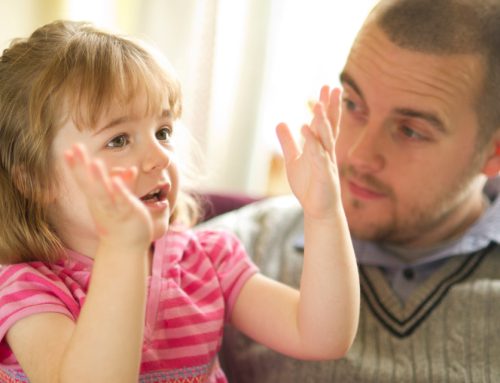Many children who struggle with communication find it challenging to respond to the topics, questions and interests of others.
The more we try to seek their engagement, the more it seems they try to disengage from us. Some children will dip further and further into their own interests, topics and scripts. Others will turn away from us and seemingly ignore or not even seem to hear our attempts to engage them in conversation. Other will find our constant efforts quite dysregulating and may either shut down or exhibit challenging behaviours. What to do when your child or a child you educate struggles to engage in back and forth conversation or interaction?
The Power of Declarative Language
The day a parent of one of my young clients suggested I read The Declarative Language Handbook by Linda K Murphy really turned things around for me. This brief but incredibly insightful and helpful little guide provides adults with a range of simple tools that have the power to really transform the way we interact with children who some would describe as ‘disinterested’, ‘daydreamers’ or even ‘non compliant’. Since making a concerted effort to implement the strategies that Lindy recommends I have seen incredible results.
It all starts with taking the perceived pressure to communicate OFF the child and establishing a lovely connection.
Declarative Language put simply means to make simple comments about what one can observe (see, feel, smell, taste) and what one thinks whilst interacting with a child. Instead of asking questions, change your language into simple comments.
Using words that include 1st person pronouns such as I, We, Let’s, My and cognitive verbs such as “I wonder” “I know” “I am thinking that…” really does open the child up to considering different possibilities and ideas and tempt them to enter the world of their interaction partner and tune in even if just for a moment.

Interested in Learning More?
I would highly recommend purchasing the text of course but, to start, you can look no further than this lovely summary blog here where Linda provides a free to download Declarative Language Cheat Sheet. https://www.declarativelanguage.com/sunday-snippets-of-support/declarative-language-cheat-sheet
Speaking from experience, it does feel awkward at first when you start intentionally using this type of language, but stick with it. It really does yield some pretty amazing results with many children and is a good reminder that sometimes it is not the child we need to change but the environment in which that child is growing and interacting.
Declarative Language techniques can be used with children of all ages. Give it a try. You won’t be disappointed.





